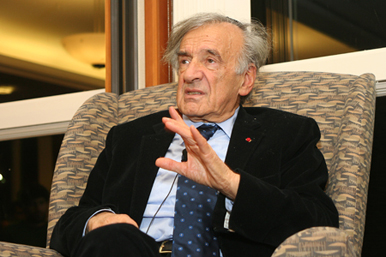Elie Wiesel urges U.S. action on Darfur
Nobel laureate: "We are here because we refuse to be silent.

Nobel Laureate Elie Wiesel knows the price of indifference to genocide. A survivor of the Nazi Holocaust, Wiesel spoke out a decade ago about the massacres in Rwanda — and for the past several years has been calling attention to the ethnic and political conflict in the Darfur region of Sudan. On April 30, Wiesel joined clergy, politicians including Sen. Barak Obama (D-Ill.), and actors like George Clooney at a rally in Washington, D.C., to urge the George W. Bush administration to take decisive action, such as backing the deployment of a multinational peacekeeping force, to stop the slaughter in western Sudan.
“Silence helps the killer, never the victims,” said Wiesel (Hon.’74), Boston University’s Andrew W. Mellon Professor in the Humanities. “And to the eyes of the victims, the world remains indifferent to their plight. We are here because we refuse to be silent.”
The gathering on the National Mall, one of a dozen events across the country Sunday sponsored by the Save Darfur Coalition, attracted about 15,000 people. “Darfur today is the capital of the world’s human suffering,” said Wiesel, the rally’s first speaker. “Darfur deserves to live. We are its only hope.”
More than 200,000 people have died and more than two million have been displaced in Darfur since violence erupted in February 2003, when two rebel groups — the Justice and Equality Movement and the Sudan Liberation Movement — intensified their armed struggle against the National Islamic Front regime in Khartoum. The government responded by supporting militias, known as Janjaweed, who began killing non-Arab ethnic Africans they consider sympathetic to the rebels.
Since 2004, the House and Senate have urged stronger peacekeeping missions in Darfur, and President Bush said last summer — and again last week — that the killings constitute genocide. This declaration was a departure from the cautious terminology used by the United Nations and some administration officials in describing the situation over the past two years.
Wiesel has been calling for not only a more intensive international humanitarian assistance effort, but also a willingness to warn the government of Sudan to cease and desist its practice of racial cleansing. “We are here because of leaders who are timorous, complacent, and unwilling to take risks,” he said. “We want them to take risks and stop the massacre.”
Wiesel, who won the Nobel Prize for Peace in 1986, has gained international recognition as a human rights activist and a distinguished scholar of religion and the humanities. Among his 40 books is the memoir Night, which chronicles his experiences in the Auschwitz and Buchenwald concentration camps.
When nations repeatedly turn a blind eye to mass murder, Wiesel said, comparisons to the Holocaust are inevitable. “As a Jew, I’m here because when we needed people to help us, nobody came,” he said, therefore, those who have suffered have an obligation to help today’s victims of persecution. “I learned that suffering confers no privilege. It’s what we do with it. And that’s the moral message: not to stand by. Therefore, we are here.”
In western Sudan, some 7,000 African Union troops have failed to stop the violence, which is now spreading into refugee areas in neighboring Chad. Activists are calling on Bush to appoint a special envoy for Darfur. During ongoing peace negotiations, which recently faltered in Nigeria after rebels rejected an agreement, the plight of the two million refugees has worsened. On April 28, the U.N. World Food Program, citing lack of funds, said it was cutting rations in half.
“For the sake of humanity,” said Wiesel, “save Darfur.”